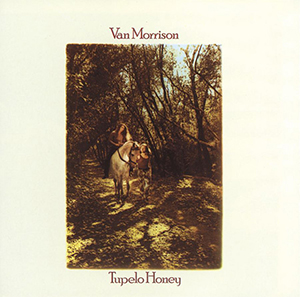Tupelo Honey
| Tupelo Honey | ||||
|---|---|---|---|---|
 |
||||
| Studio album by Van Morrison | ||||
| Released | October 1971 Reissued January, 2008 |
|||
| Recorded | Spring-Summer, 1971 at Wally Heider Studios and Columbia Studios in San Francisco, California | |||
| Genre | Rock, folk rock, blue-eyed soul, country | |||
| Length | 40:42 | |||
| Label |
Warner Bros., Polydor |
|||
| Producer | Van Morrison Ted Templeman |
|||
| Van Morrison chronology | ||||
|
||||
| Singles from Tupelo Honey | ||||
|
||||
| Professional ratings | |
|---|---|
| Review scores | |
| Source | Rating |
| All About Jazz | (not rated) |
| Allmusic | |
| BBC | (not rated) |
| Robert Christgau | A− |
| Goldmine | |
| Rolling Stone | |
| Uncut | |
Tupelo Honey is the fifth studio album by Northern Irish singer-songwriter Van Morrison. It was released in October 1971 by Warner Bros. Records. Morrison had written all of the songs on the album in , before his move to Marin County, California, except for "You're My Woman", which he wrote during the recording sessions. Recording began at the beginning of the second quarter of 1971 at the Wally Heider Studios, San Francisco. Morrison moved to the Columbia Studios in May 1971 to complete the album.
The namesake for the album and its title track is a varietal honey produced from the flowers of the tupelo tree found in the Southeastern United States. The album features various musical genres, most prominently country, but also R&B, soul, folk-rock and blue-eyed soul. The lyrics echo the domestic bliss portrayed on the album cover; they largely describe and celebrate the rural surroundings of Woodstock and Morrison's family life with then-wife Janet "Planet" Rigsbee.
Tupelo Honey received most of its success in America; it charted at number 27 on the Billboard charts and in 1977 it was certified gold by the RIAA. It failed to reach any of the European or other world-wide charts. The album yielded two hit singles, the hymn-like title track, as well as the R&B-flavored "Wild Night". The third released single, "(Straight to Your Heart) Like a Cannonball", was less successful and did not enter the Billboard Hot 100. The album received mostly positive reviews from music critics at the time of its release, but Morrison's biographers were less favorable towards it in later years.
...
Wikipedia
